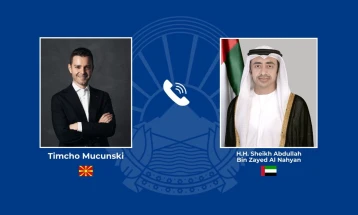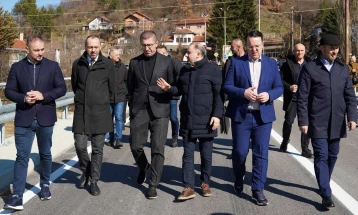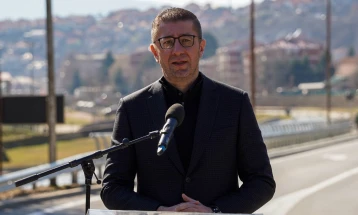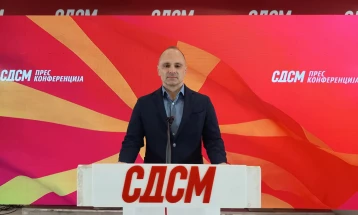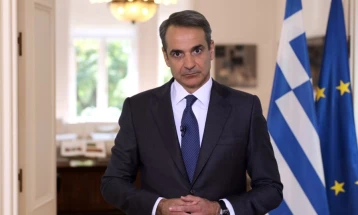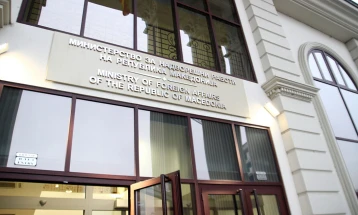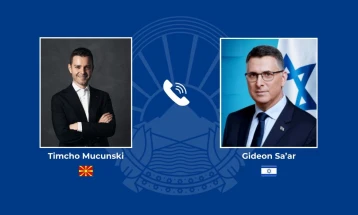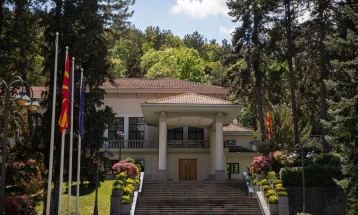MEP Strik: Politicians should take voters seriously and be honest
- Take the citizens and the voters seriously and be honest, Tineke Strik, member of the European Parliament and member of the Joint Parliamentary Committee, urges the political parties and the candidates vying in the elections in an interview with MIA. According to the MEP, the constitutional reform must be concluded before accession talks with the Union are opened. It’s an illusion that it might not happen, she notes.
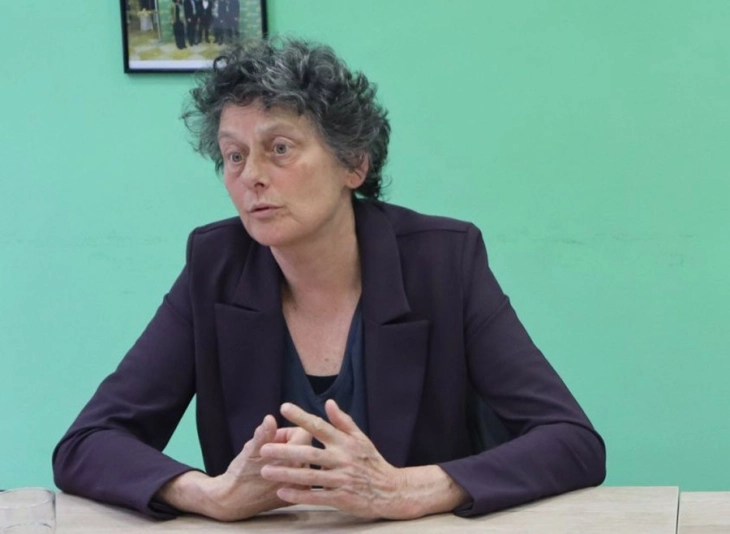
Skopje, 11 April 2024 (MIA) – Take the citizens and the voters seriously and be honest, Tineke Strik, member of the European Parliament and member of the Joint Parliamentary Committee, urges the political parties and the candidates vying in the elections in an interview with MIA. According to the MEP, the constitutional reform must be concluded before accession talks with the Union are opened. It’s an illusion that it might not happen, she notes.
In the interview, Strik says the politicians in the country should be honest with the citizens because there is disinformation, especially about the election process.
“I think they should acknowledge the traumas with the Prespa Agreement, and later on with the French proposal, the sacrifices they had to make. Now, we have to deal with this fact that the constitutional reform need to be done before we go into the negotiations for the accession. Politicians who say we don’t accept this demand, that they’ll renegotiate, or they’re going to change the order, they create an illusion. Because this will not happen. It’s a dangerous illusion because it would mean much more time would elapse, which in the end will create only more disillusion, and less support from the Macedonians for the EU. Also, we’d risk to lose the current momentum of the accession,” says Strik.
She also calls on accelerated reforms, especially in regard to rule of law, corruption and the judiciary.
The Dutch MEP says she strongly advocates for the EU to make merit-based decisions when allowing a country to start negotiating.
“I understand that the moment of real accession that is based on unanimity is quite logical. But all those decisions prior to that should not be subject to veto because that should be simply a merit-based approach. If the Commission comes with an advice that North Macedonia is ready to start talks, there should not be a possibility for a member state to abuse its position for bilateral reasons,” Strik says.
Tineke Strik is a member of the European Parliament (MEP) for the Greens/EFA Group and she is also running for re-election in the European Parliament.
During her stay in Skopje, she was joined by DOM MP Maja Morachanin for a visit to the disused chemical factory OHIS to see firsthand how the EU is helping on the field.
“They still don’t know how it is affecting the soil and the water. It should be cleaned up as soon as possible. It’s a matter of funding. This is something where we can be really concretely trying to help,” says Strik.
Below is MEP Strik’s interview with MIA in full.
You’re in a two-day visit to Macedonia? What was the purpose of your visit?
For me it is important as a member of the joint parliamentary commission to take stock of the mood of politicians and also society and how they look on the progress being made in the country. I’m strong advocate for EU integration. I really think for the Western Balkans countries, specifically North Macedonia needs to enter the EU. North Macedonia belongs to the EU. I feel this as a mutual project – the EU must really support this process and also be credible and deliver on its promises. We try to do that from the European Parliament as much as we can. We are very supportive of the process. On the other side, the citizens and the politicians also make the right choice to make at least to enter the moment of accession talks. Last year, many efforts have been made, but there is still a lot to do. I also feel a kind a sense of urgency. The civil society really sees the problem of corruption, number one that needs to be tackled and it can only be tackled with independent prosecutors and judiciary. These reforms are also vital for the accession process. It would serve the citizens and the state for more transparency and a fair treatment and also to make sure that rich companies are not simply buying their interests in society. It would also bring you closer to the EU.
You are here in a key moment for the country. The presidential election campaign was launched, the campaign for the parliamentary elections starts in less than two weeks. You’ve held meetings with all top officials in the country. Did you discuss with them the elections and what is your message to the citizens in the context of the elections?
My message was – take the voters seriously and be honest, because there’s a lot of disinformation, specifically about the election process. I think they should acknowledge the traumas with the Prespa Agreement, and later on with the French proposal, the sacrifices they had to make. Now, we have to deal with this fact that the constitutional reform need to be done before we go into the negotiations for the accession. Politicians who say we don’t accept this demand, that they’ll renegotiate, or they’re going to change the order, they create an illusion. Because this will not happen. It’s a dangerous illusion because it would mean much more time would elapse, which in the end will create only more disillusion, and less support from the Macedonians for the EU. Also, we’d risk to lose the current momentum of the accession.
With the Russian invasion of Ukraine there has become a huge momentum and awareness of the Commission and member states that we should be much more seriously responding to global threats and that we need to unite ourselves with our neighbors. The enlargement is something that really needs to be done. In the Western Balkans, we see that Albania and Montenegro could make steps. They are now talks with Bosnia although I cannot say they are committed to all the criteria. It would be such a shame because North Macedonia is already so far away in its reform that they would lag behind just because of this obstacle. And also if we wait for more years, there will be more people leaving the country for jobs in the west of Europe. I think in the end it would really affect the interest of the country.
Don’t you think Macedonia had done so much regarding the EU’s requests, especially with the Greek demand for name change and also now with Bulgaria and the veto that had been imposed? In fact, one EU member country we are prevented from opening talks with the EU. It is a country that doesn’t recognize our minority in there while also being in the EU. We have been respecting the rights of all ethnic communities.
When Bulgaria used the veto, I fiercely criticized them and I keep on criticizing it. And I also criticized the other member states that they didn’t put enough pressure on Bulgaria to not abuse its position as a member state. I think with this veto, the clear criteria of Copenhagen have been polluted, so to say.
In that case, do you support changes to the voting process in the Council of the European Union?
Definitely. I understand that the moment of real accession that is based on unanimity is quite logical. But all those decisions prior to that should not be subject to veto because that should be simply a merit-based approach. If the Commission comes with an advice that North Macedonia is ready to start talks, there should not be a possibility for a member state to abuse its position for bilateral reasons. We have made in Parliament a new position on enlargement, how it would look like. There, with a strong majority in Parliament, we said the right to veto should be abolished so that it cannot be abused. What happened with Bulgaria and North Macedonia, can also happen with other neighboring country abusing its power. We also said it should be with qualified majority.
During your stay in Skopje, you also visited the disused factory OHIS. Why were you there?
I wanted to see how the EU can support in practice. I visited the old chemical factory to see how much garbage there still is, how much toxic material there still is. In a very safe way they are dismantling it and transporting it. But it is a very expensive trajectory. They are really depending on the funding. For me, it is a really good reason to urge the European Commission about the funding. It’s so close to the city. They still don’t know how it is affecting the soil and the water. It should be cleaned up as soon as possible. It’s a matter of funding. This is something where we can be really concretely trying to help. When I visited a year and a half ago, we talked about high energy prices. It was because of the war and also because North Macedonia was not aligning with the EU’s energy policies. We made a study to see how the EU could also make sure that North Macedonia is also sharing common polices, lowering the prices and stepping up the energy policy. I think it’s very important that we cooperate on this tangible and concrete field.
You’re also launching a campaign to be again elected as member of EU Parliament. How long have you been an MP?
I was a member for five years. I was a member of the LIBE committee and AFET, specifically dealing with the accession of Bosnia and North Macedonia. Before I was already in the Parliamentary Assembly of the Council of Europe. I’ve worked a lot with the Western Balkan countries.
What will be the focus of your campaign?
We have a coalition with the social democrats. In the Netherlands it is quite unique – there is one common list. And for us, the Green Deal is really vital. In the last elections, we saw a green wave with many scholars demonstrating for more ambitious measures. In the past half a year and a half, there is a serious decline, specifically in the political support. The farmers’ protests, the EPP has been pushing for less ambition and we think this is not appropriate. There is still a huge urgency to have renewable energy, to have cleaner policies because the pollution is ongoing. If we’d been hearing about politicians advocating for opening new coal mines, this is going backwards. A lot needs to be done there. We also advocate for rule of law, because within the EU we have our problems of course, with Hungary and Slovakia backtracking. We think the Commission should be much tougher, that there should be no impunity. And the EU must become stronger as a global actor. We’ve seen that with Russia and also with China. We can do that if we have better policy-making and if we are not having national differences with vetoes. We need to become more effective and make sure that we have our own products so we are not dependent. We have to have social policy, energy transition, the climate policy should be just, should be social and affordable for everyone, so no one is left behind.
More than a half of these issues will be part of our campaigns, because we are part of Europe and we have similar issues. How much the EU’s policy might change after the EU elections for the member states and also for the countries such as North Macedonia?
It’s a mixed picture. What you see in many member states is the uprising of the right-wing populism. Also in my country, the Netherlands, extreme right are forming a government, which you see in many countries. The polls for the European Parliament show the extreme right is growing. That might not be good news about the enlargement process. On the other hand, it’s mixed because those parties that are coming from Eastern Europe are feeling a lot of urgency for completing the enlargement process. It’s also a matter of which member states – the member states that are feeling the heat of the war for instance, they are very keen in accelerating the accession process. It’s the same for the Western Balkan countries, apart from Bulgaria of course.
And I think that the ambition of being a geopolitical factor will stay on the top. The threat is still there. At the moment, there is still a huge appetite and importance given to the enlargement. That’s why I think it’s important to use this momentum. You never know how it would look like five years from now. This dynamic also changes in the countries, therefore I’d say don’t think we would do it later. For North Macedonia, it a chance to become stronger and give the people here perspective. They deserve it.
Elizabeta Veljanovska Najdeska
Edited by Bisera Altiparmakova - Marusic
Photo: Darko Popov
